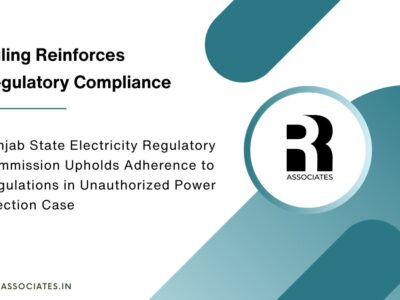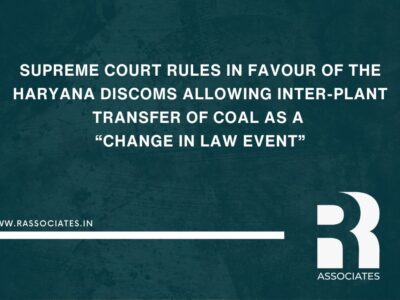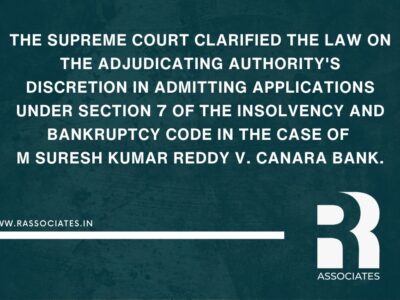
Decoding the Supreme Court’s Stance on Unstamped Arbitration Agreements: A Legal Perspective
In a recent landmark ruling, the Constitution Bench of the Supreme Court of India comprising of J. K.M. Joseph, J. Aniruddha Bose, J. Ajay Rastogi, J. Hrishikesh Roy and J. C.T. Ravikumar in the case of M/s N.N. Global Mercantile Private Limited v. M/s Indo Unique Flame Ltd. & Ors. has settled the law on the enforceability of arbitration agreements contained in unstamped/ insufficiently stamped agreements.
The Supreme Court has overruled the prior decision of the Division Bench in the same proceedings and upheld the view taken in SMS Tea Estates (P) Ltd. v. Chandmari Tea Co. (P) Ltd. and Garware Wall Ropes Ltd. v. Coastal Marine Constructions & Engg. Ltd.
The issue of reference before the Supreme Court was whether the statutory bar contained in Section 35 of the Stamp Act, 1899 applicable to instruments chargeable to stamp duty under Section 3 read with the Schedule to the Act, would also render the arbitration agreement contained in such an instrument, which is not chargeable to payment of stamp duty, as being non-existent, unenforceable, or invalid, pending payment of stamp duty on the substantive contract/instrument?
Section 35 of the Indian Stamp Act, 1899 makes it mandatory that unless the stamp duty and penalty due in respect of the instrument is paid, the instrument cannot be acted upon and, therefore, an unstamped or insufficiently stamped document cannot be admitted as evidence in court.
Interpreting the provisions of the Indian Stamp Act and Arbitration & Conciliations Act, 1996 the Supreme Court in the majority decision has held that “An Arbitration Agreement, within the meaning of Section 7 of the Act, which attracts stamp duty and which is not stamped or insufficiently stamped, cannot be acted upon, in view of Section 35 of the Stamp Act, unless following impounding and payment of the requisite duty, necessary certificate is provided Under Section 42 of the Stamp Act.”
The Supreme Court while holding the same has also held that an arbitration agreement, despite being a clause in a contract is not a standalone agreement. In essence it is a part of the underlying contract and therefore should be subject to the payment of the requisite stamp duty. In terms of the Supreme Court’s interpretation for an arbitration agreement to be acted upon it must be adequately stamped as per the provisions of the Indian Stamp Act, 1899.
The minority decision has, however, opined that all preliminary issues including insufficiently/unduly stamped arbitration agreements are to be referred to the Arbitral Tribunal as per Section 16 of the Arbitration & Conciliation Act, 1996. The Supreme Court has also observed that the rationale behind Indian Stamp Act, 1899 is to secure revenue for the State and not to be used as means to harass the litigant concluded that unstamped instruments can be acted upon after payment of duty and penalty. Initial defects can be cured and it is never the intention of the legislature to treat an initially unstamped instrument as non-est in law.
OPINION:
The Supreme Court’s decision offers considerable clarity on the legal position of unstamped arbitration agreements. It signifies strict compliance with the statutory provisions thus emphasizing the necessity for an arbitration agreement to be stamped.
However, this ruling presents some implications that may prove challenging for the arbitration practice in India. Traditionally, arbitration has been favoured as an Alternative Dispute Resolution due to its speedy disposal, flexibility and expertise. Even so, the obligation to adequately stamp arbitration agreements may lead to delays in the initiation of arbitration proceedings. As per a report by NITI Aayog, the average time taken to resolve disputes through Arbitration in India ranges from 18 months to 3 years. With the additional requirement of making stamp duty mandatorily payable on arbitration agreements, this period might potentially increase as the matter shall be first subjected to adjudication in terms of the Indian Stamp Act, 1899.
Furthermore, this decision may raise concerns about India’s ‘pro-arbitration’ stance which is crucial for attracting International Commercial Arbitration. According to the Economic Survey 2018-19, over 70% of India’s 1,320 bilateral investment treaties involve International Commercial Arbitration. The ruling could be seen as a potential deterrent to the use of Arbitration, given the additional layer of formalities and potential complications it introduces.
However, the legal rationale behind the judgment is to ensure the legality and validity of arbitration agreements. This ruling reinforces the significance of adherence to statutory provisions, fiscal duties and safeguards the integrity of the arbitration process.
In conclusion, this ruling brings the legality of arbitration agreements under sharp focus and underlines the importance of a balance between procedural requirements and the advantages of arbitration. To mitigate potential delays, it may be beneficial to simplify the stamping process for arbitration agreements in the future thus, making it more user-friendly without compromising legal requirements.




